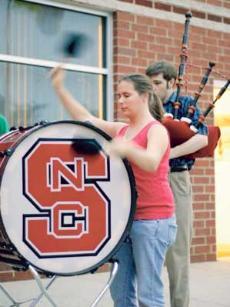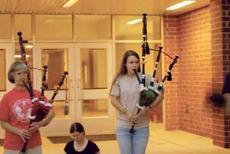The NCSU Pipes and Drums Band is in danger of losing its funding after administration officials have decided to put their foot down over the group’s lack of student participation.
J. Mark Scearce, director of the music department, said he told the band it must maintain a minimum of 10 students in the fall and spring semesters for it to continue through the next academic year. The department pays the band’s director, John Sprague, about $8,000 a year to act as adjunct faculty.
“There is concern over whether we’re serving students or not,” Scearce said. “There’s no money to continue services students aren’t availing themselves of.”
According to Sprague, low student enrollment has plagued the band for years. In fact, when he began directing the band in 1977, he said there were only about four total members.
That trend changed slightly, according to band member Emily Sprague. She said that after her husband John began inviting community members to join the ensemble, participation swelled to about 50 drummers and bagpipe players.
“The irony is that we have had more numbers than we’ve ever had,” she said.
But not when it comes to student enrollment in the course, listed as MUS 100J in Pack Tracks. Although the band has nine students registered for the fall, in the spring it had only two.
This is the statistic that concerns Alex Miller, the associate vice chancellor for Student Affairs responsible for ARTS N.C. State.
Normally, he said, courses on campus have to have at least 12 students enrolled.
“If a course doesn’t have enrollment, it’s canceled,” he said. “It’s that simple.”
Although John Sprague said the University has a valid point when it comes to the lack of student involvement, he said the opportunity is there for them. He also pointed out that because so many community members participate in the program, the pipes and drums band serves as an outreach program for the University. Especially since the band performs an average of 25 times a year, all year round.
He added the University gets all this “for about half of what a graduate assistantship is worth.”
But $8,000 is no small sum to ARTS N.C. State, Miller said.
“Every $1,000 here and there means something,” he said.
He said the amount the University pays to Sprague could be used to pay for a new class each semester with the potential to serve 25 to 30 students.
Although Sprague said the band is “just one short of the magic number,” he said he is concerned about how willing the administration is to dismiss a band that has served the University for almost 40 years.
“State has never been much for traditions,” Sprague said.
Miller however, disagrees.
“It’s because of traditions that they’ve been allowed to continue this way, year after year, under-enrolled,” Miller said. “It’s not often people get a six-to-seven-year grace period when the issue is clear.”
Miller, however, said there may be a solution for the band: moving it out of its current status as a typical course and offering it through continuing education.
According to Miller, participants would be required to pay a fee to join the band and would register through the Office of Professional Development.
“That would show the commitment of these people to the program,” Miller said.









